Gary Johnson Files Complaints With FEC, FCC Over Debate Exclusion
Gary Johnson is right to be upset that he's been excluded from debates, but he shouldn't get the government involved.
I’ve made no secret here of the fact that I’ve been a supporter of former New Mexico Governor Gary Johnson’s Presidential bid, but I’ve got to say that I find this development very disappointing:
Gary Johnson’s presidential campaign is filing an official complaint with both the Federal Election Commission (FEC) and the Federal Communications Commission (FCC) over their candidate’s exclusion from the most recent GOP debate, Johnson’s campaign announced Tuesday.
Johnson’s complaint charges that debate sponsor CBS significantly contributed to the candidates who were allowed to participate in the debate, “directly and significantly supporting those candidates it favors, and advocating the nomination of one of their favorites and opposing the nomination of [Johnson], whom CBS evidently disfavors.”
Johnson’s campaign has protested his exclusion from debates in the pastthrough various means, typically using email and social media
The former New Mexico governor has been excluded from most of the presidential debates, failing to meet various requirements set by debate hosts. Hosts have cited his low polling numbers—typically under two percent—and in at least one case the fact that Johnson had not participated in enough of the other nationally televised debates.
(…)
Saturday’s debate, co-hosted by CBS and National Journal, was the first debate to air on broadcast television. According to Johnson’s complaint, “the public owns the airways over which CBS broadcasts, and the public deserves to be free from bias- favoring some candidates over others- as well as illegal support of certain presidential candidates on national network television.”
Johnson does have a point about what sometimes seem like arbitrary debate rules. As he has stated on more than one occasion, a media company like CNN will set up a debate rule that says that the candidate must receive a certain percentage of support in national polling over a certain period of time. Even if you accept the argument that this is a reasonable rule, it becomes a Catch-22 once you realize that the media polls routinely leave Johnson’s name, along with the names of other candidates like former Louisiana Governor Buddy Roemer, off the list of candidates they ask poll respondents about. When you’re not even including a candidate in a poll, creating a rule that says that they can only come to a debate if they receive a certain level of support in polls they weren’t even part of becomes something of a ridiculously arbitrary self-fulfilling prophecy. Personally I’d prefer debate rules something along the lines of what James Joyner suggested the other day:
My instinct would be to invite anyone who is a declared candidate and is either at 10 percent in the polls (I’d go with the RealClearPolitics average or some other index rather than the “any national poll” standard) or who has held in the past six years one of the following offices: President, Vice President, governor, or US Senator.
If applied at the outset of this race, that formula would have included Johnson and Santorum while excluding Bachmann, Cain, Paul, and Gingrich. Adding US Representative to the list-which goes against modern precedent but one could argue still satisfies the “serious candidate” requirement-would include all the national candidates except Cain, who was nowhere in the polls until getting exposure in the debates.
It’s not perfect, but it’s better than what we have now in several respects. Once you get down to the point where it’s clearly than only 3-4 candidates are serious contenders, debate hosts should be free to narrow the field down, of course, but in the beginning it seems best to let the public be exposed to as many credible candidates as possible.
The important point, though, is that this is something that should be adopted voluntarily. Even though I’d like to see him in more debates, I am troubled by the idea of Johnson going to government agencies to protest the actions of private media companies and state-level political parties. If the First Amendment means anything, it means that these organizations to be free to invite, or not invite, whomever the wish to their functions. If the rules are unfair, then it’s perfectly valid to take to the media to complain about them, but using the power of the state to try to compel them to act? That’s just wrong in my eyes.
It’s worth noting that the arguments that Johnson seems to be advancing here have been raised before, and rejected by pretty much every forum that they have been presented to over the years. The networks, and the political parties and other private organizations that have co-sponsored debates during this election cycle, have the right to run their forum as they see fit. Johnson is right to be frustrated by his exclusion from the debates, and the polls, but he’s wrong to try to use the power of government to his benefit. Like I said, disappointing.
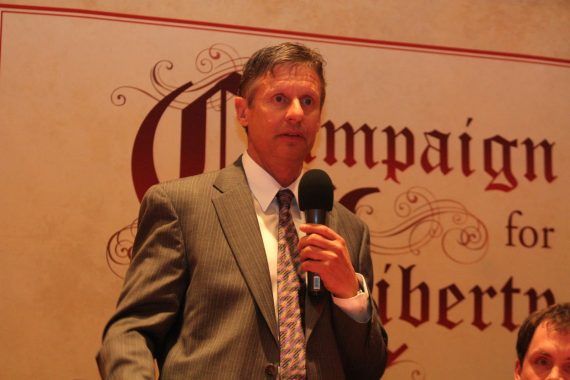

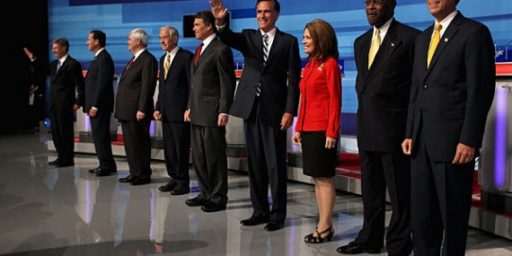

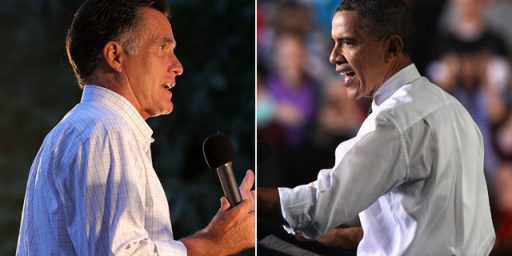
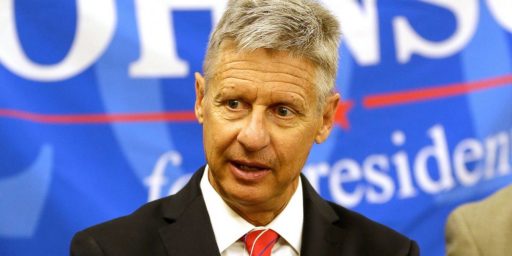
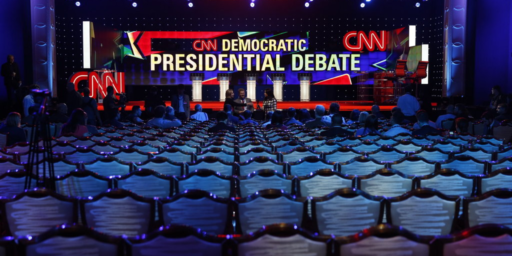
Inevitable.
Without speaking to the virtues or lack of for this case, government is the counterweight to big business.
One of the reasons we have a government is to do that, to act as another venue when appeals to the billionaires somehow fail to have any effect. Government exists as a second system, one that theoretically is driven by something other than money, money and more money.
What’s needed is a separation of Wealth and State, and a degree of balance between the two. Both need to work, both need to push against each other. This is self-evident to everyone but libertarians — although it seems at least Mr. Johnson is one libertarian having a moment of enlightenment.
Of course he doesn’t reach enlightenment when the issue is someone else being treated horribly by business, he only reaches enlightenment when it’s him being screwed. Surprise.
@michael reynolds:
Except we have that pesky First Amendment that makes the relief Johnson asks for impossible and illegal. And I consider that a good thing.
If the rule would have excluded three of the four current front runners in Iowa from even getting into the race, what’s the argument for it being a good rule?
CBS is broadcast, not cable, so it’s using the public airwaves. It is subject to FCC regulation, though again, I have no idea whether this self-serving libertarian lunge toward big government has any legal validity.
There are no “equal time” rules for broadcast television anymore though and, thankfully, the so-called “Fairness Doctrine” is a relic of the past. I don’t see Johnson or anyone else having a legal leg to stand on
@Doug Mataconis:
I’d defer to your legal expertise. I was offered a path to becoming a lawyer at one point in my life. I declined on grounds that it looked like way too much work.
The number of lawyers I know who have moved into not-legal careers is quite large, actually.
Heck, I know one Bankruptcy lawyer who left her practice to become the Business Manager of a landscaping company.
Johnson goes the Maurice Clarett route…..N’awesome.
I like Johnson, and the content of what he says deserves to heard by more potential voters. If he’d been allowed in more debates, he would probably be polling higher, but unless he got better onstage his numbers would have hit a ceiling. In the two debates he was in he definitely seemed uneasy in front of a debate audience. I’m not saying that should overshadow his ideas, but I’m afraid it would.
@Doug Mataconis: We all know one who seems to have left his practice to become a reductionist-minded libertarian blogger who likes to use the Constitution to say, “That’s too bad, it must suck to be you. Now STFU.”
@michael reynolds: I think you made the right choice. Would you really want to be Doug?
Gah. This runs directly counter to the First Amendment (obviously). Does Johnson not realize that? A few cycles ago (a decade or more, I think), a group of third-party candidates attempted something similar with the general-election debates. Except the Libertarian candidate, who basically said, “See, this is what we’re talking about!”
They’re private broadcasters. They can use any criteria they want. If they want to limit the debate to candidates who wear pink Speedos and answer all questions in rhyming couplets, they can do it.
Here’s a successful two-term (term limited) governor of a swing state, who built his own construction business.
Johnson’s practical, libertarian, pro-free-enterprise and anti-interventionist ideas might just be what Americans are looking for. He doesn’t have the baggage or crazy cootiness of Ron Paul.
Whether the law says he should get a shot or not, I’m pissed off that he’s been excluded from the debates while Cain, Huntsman, and Santorum got in. What was Cain polling at the beginning?
What’s the real reason Johnson’s been shut out?
Why, it’s almost like we live in an oligarchical “managed” democracy or something.
@James H:
It’s a little bit complicated by the fact that the broadcast spectrum is a public commons licensed to broadcasters, not owned by them, isn’t it?